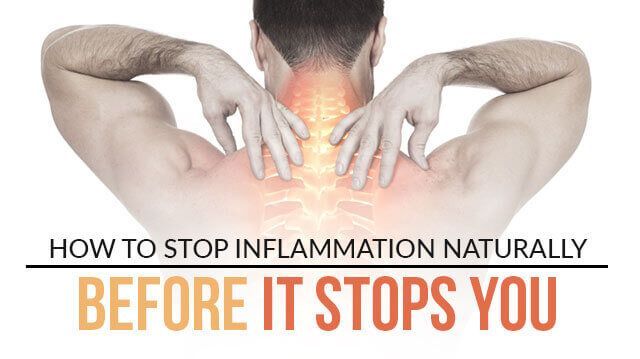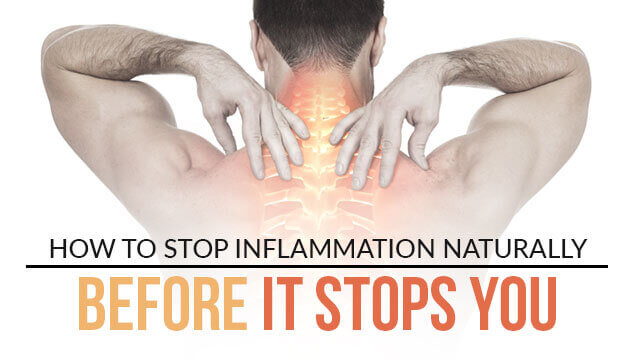
If you have ever had a sore throat, rash or a sprained ankle, you have experienced the body’s response: inflammation. In specific cases, for a short period of time, inflammation is what the body naturally does to fight infection, heal injuries and combat irritants. However, it is imperative that you stop inflammation when it becomes chronic.
No brakes
Chronic inflammation is basically like a car rolling down a never-ending hill without brakes; it doesn’t have the ability to stop. So with the inflammation “on” switch stuck, your body thinks that you are in imminent danger even when you’re not. It’s a good thing gone bad, starting perhaps with swelling and scar tissue, that becomes a serious problem over time.
Chronic inflammation is linked to virtually every disease in one way or another. More often than not, it is the eventual signs of inflammation that alert people to the presence of disease. By that time, it has usually been present in the body for a while.
Here are just a few of the illnesses that may result from prolonged or chronic inflammation:
- Alzheimer’s disease. Brain cells may be destroyed by chronically elevated levels of inflammation.
- Congestive heart failure. Chronic periods of inflammation may cause the heart muscle to wear out and waste away.
- Fibromyalgia. Inflammation attacks the connective tissues, leading to pain.
- Asthma. Small cytokines may cause autoimmune reactions to flare up in the lining of the airways.
- Autism. When inflammatory cytokines are released in the brain, it may arrest the development of the right hemisphere.
- Gastroesophageal reflux disease (GERD). The esophagus and digestive tract become riddled with inflammation, most often in response to food sensitivities and pH levels.
- Arthritis. Inflammatory cytokines may cause cellular activity that leads to the destruction of synovial fluid and joint cartilage.
- Neuropathy. Inflammation induces autoimmune reactions that attack the vascular, myelin, and connective tissues, potentially causing nerve irritation.
- Psoriasis. The presence of chronic inflammation levels in the liver and gut may lead to poor natural detoxification and the buildup of irritating substances in the body, which can manifest on the skin.
- Carpal tunnel syndrome. Chronically elevated levels of inflammation may cause shortened tendons in the forearm and wrist, and the excessive muscle tension may result in compressed nerves.
- Celiac disease. Long periods of chronic immune system inflammation may bring about damages to the lining of the intestine.
Drugs are not always the best option
Frequently in Western medicine, doctors treat pain and inflammation with medication. While these drugs ease pain, they do little to combat the underlying cause and often come with a host of dangerous side effects.
Here are three natural inflammation fighters that work with your body to stop inflammation at the root.
Flax (Linum usitatissimum)
For vegans and vegetarians, flax is one of the best sources of omega-3 fatty acids around. These small but mighty seeds are unique in that they are an extremely concentrated source of lignans and inflammation-taming alpha-linolenic acid (ALA). Lignans help cleanse the body with their fiber-like qualities and provide a mega-dose of antioxidant protection. Incorporating flax into your diet will also protect your cardiovascular system, which takes a hard hit from excessive systemic inflammation.
Incorporate organic flaxseed into your favorite baked goods. The ALA in flax maintains its nutritional value even when cooked at oven temperatures for three hours.
Try sprinkling it in soups, salads, dips, shakes, smoothies and more, as it has a neutral flavor. Just be sure to grind your flaxseeds before use because the nutrients become more bioavailable than in whole-seed form. Keep in mind that once the seeds are ground, they go rancid quickly because of the high level of natural fat. Store ground flax in the fridge in an airtight container and use within a few days of grinding.
Turmeric (Curcuma longa)
Orange in color, this ancient spice is part of the ginger family, another incredibly potent herb, and has been used medicinally in India and China for centuries. Turmeric’s two main components, curcumin and curcuminoids, have anti-inflammatory effects so powerful they can be compared to those of the common NSAIDs without the liver-damaging side effect. One study found that using the herb as a pre-treatment for arthritis inhibited its onset and that those already suffering from inflammation-based pain experienced relief when treated with turmeric.
Incorporate turmeric into most dishes for an added dash of flavor with a bright yellow flare. It can also be taken in capsule form or applied topically via a poultice.
Licorice (Glycyrrhiza glabra)
While the cherry-flavored chewy candy may be the first thing that pops into your head with the mention of licorice, this potent herb may not be as sweet to taste, but it will keep inflammation at bay. Licorice works similarly to the body’s own inflammation-battling corticosteroids when taken orally.
 A study found that licorice’s anti-inflammatory benefits are comparable to that of the prescription medication diclofenac sodium, and evidence from the study suggests that licorice may be incorporated into a short-term pain-management treatment program.
A study found that licorice’s anti-inflammatory benefits are comparable to that of the prescription medication diclofenac sodium, and evidence from the study suggests that licorice may be incorporated into a short-term pain-management treatment program.
Licorice can be taken orally via capsule, tablet or powder. Make a tea with the leaves or apply topically.
Adopt an anti-inflammatory lifestyle
In addition to the herbs above, there are a number of ways that you can stop inflammation by adopting an anti-inflammatory lifestyle. Doing so will give your body what it needs to stay well and help keep your body’s inflammation response within normal limits, thus reducing the chance that you will develop any serious inflammation-induced conditions.
Get enough quality sleep: Poor sleep can cause our bodies to be more susceptible to inflammation by altering normal levels of cortisol (fight or flight) and insulin. High-stress levels are associated with elevated cortisol levels.
Regular exercise: The right amount of exercise can help us become less susceptible to muscle soreness, essentially working our body into a state of resistance to over-inflammation.
Anti-inflammatory eating
Particular foods and eating patterns are linked with lower levels of inflammatory biomarkers. This diet-inflammation connection might be one explanation for disease protection.
Andrew Weil, MD, director of Integrative Medicine at the University of Arizona, reported at the Annual Nutrition and Health Conference in San Francisco in 2011 that inflammatory status is strongly influenced by diet.
“Most people go through life in a pro-inflammatory state because they eat a modern, industrialized diet, which gives you carbohydrates and fats without all of the protective elements,” Weil said. He reported that a diet including protective foods, such as vegetables, fish and whole grains, offers anti-inflammatory benefits that promote healthy aging and support optimum health at any age.
Optimal diet patterns
To stop inflammation, follow a diet rich in whole foods, including carbohydrates such as gluten-free whole grains and fruits, fats like nuts, coconut oil and avocados, and protein sources such as fresh-caught fish and legumes.
The Mediterranean diet, a traditional diet pattern that focuses on whole plant foods, is linked to lower inflammation and age-related disease risk.
Work with your body
The good news is that it is possible to partner with your body to stop inflammation. When you adopt an anti-inflammatory lifestyle, pay attention to the signs and signals that your body is giving you, and recognize how much control you actually do have over your health — it is possible to stop inflammation far before it stops you!
You can also learn more about how to wipe out chronic inflammation in this FREE Soft Cover Book
—Susan Patterson
Susan is the Content Director at The Alternative Daily, a Certified Health Coach, Certified Metabolic Typing Advisor and Master Gardener. With an extensive knowledge of whole foods and wellness, Susan has authored over 3,000 articles and numerous e-books. She presently lives in the mountains of Arizona where she enjoys hiking, biking, gardening and pursuing a healthy lifestyle with her three daughters and numerous animals.

